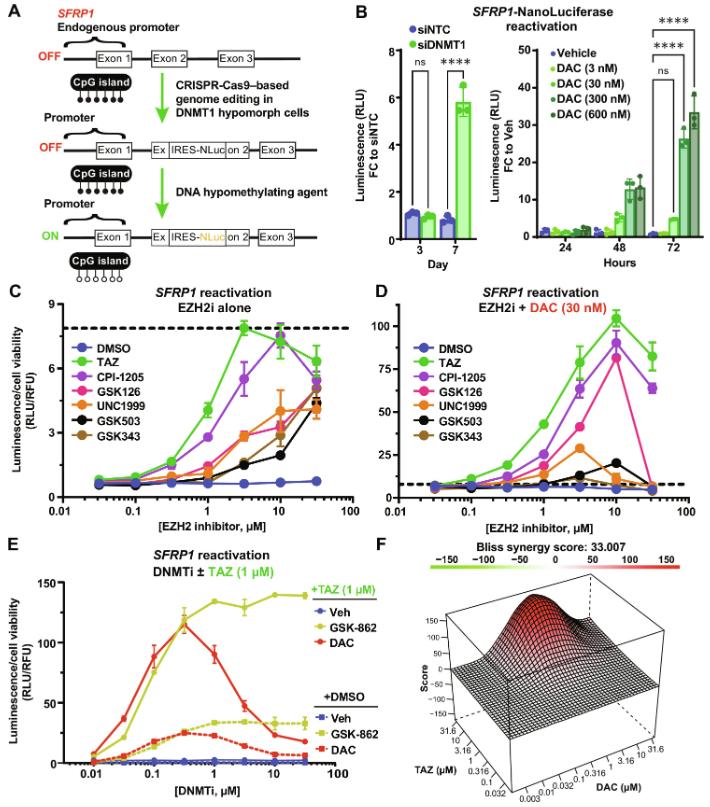DNA methyltransferase inhibitors (DNMTi, DNA methyltransferase inhibitor) have limited efficacy in solid tumors. Colon cancer cells exposed to DNMTi accumulate lysine-27 trimethylation on histone H3 (H3K27me3). Recently, in a research report titled "Select EZH2 inhibitors enhance viral mimicry effects of DNMT inhibition through a mechanism involving NFAT:AP-1 signaling" published in the international magazine Science Advances, scientists from the Van Andel Institute and other institutions in the United States have discovered through research that two drugs that can cause malignant cells to behave like viruses may help treat colorectal cancer and other solid tumors in humans.
In preclinical studies, the researchers revealed how low doses of DNMT inhibitors sensitize cancer cells to EZH2 inhibitors, creating a double whammy against cancer cells that is better than either drug alone. The findings may pave the way for an upcoming Phase I clinical trial evaluating the drug combination in patients with colorectal cancer or other solid tumors. Researcher Professor Scott Rothbart said that DNMT inhibitors are approved to treat human blood cancers, while EZH2 inhibitors are also approved to treat blood cancers and a rare sarcoma. So far, its therapeutic success in human solid tumors such as colorectal cancer has been very limited.

Figure 1. Select EZH2is enhance the transcriptional activating effects of DNA hypomethylating agents. (Chomiak A A, et al. 2024)
Our findings highlight the therapeutic promise of combination cancer therapies by revealing how the two drugs interact. DNMT inhibitors prime cancer cells in a way that makes EZH2 inhibitors more effective. DNMT and EZH2 inhibitors work by controlling epigenetic processes that regulate gene expression. In cancer, epigenetic errors enable malignant cells to survive and proliferate, providing key targets for the development of novel therapies. Previous research has shown that DNMT inhibitors can cause cancer cells to behave as if they are infected by a virus, which makes the cells more susceptible to attack by the host's immune system.
| Cat.No. | Product Name | Price |
|---|---|---|
| CSC-DC004462 | Panoply™ Human DNMT1 Knockdown Stable Cell Line | Inquiry |
| CSC-RT0078 | Human DNMT1 Knockout Cell Line-HCT116 | Inquiry |
| CSC-RT0111 | DNMT1 Knockout Cell Line-A549 | Inquiry |
| CSC-RT0470 | DNMT1 Knockout Cell Line-293T | Inquiry |
| CSC-SC004462 | Panoply™ Human DNMT1 Over-expressing Stable Cell Line | Inquiry |
| AD05012Z | Human DNMT1 adenoviral particles | Inquiry |
| LV11026L | human DNMT1 (NM_001379) lentivirus particles | Inquiry |
| LV11027L | human DNMT1 (NM_001130823) lentivirus particles | Inquiry |
| CLKO-0733 | DNMT1 KO Cell Lysate-HEK293T | Inquiry |
| CDCB167514 | Chicken DNMT1 ORF Clone (NM_206952) | Inquiry |
| CDCB176155 | Danio rerio DNMT1 ORF Clone (NM_131189) | Inquiry |
| CDCL183944 | Human DNMT1 ORF clone(NM_001130823.1) | Inquiry |
| CDCR056734 | Mouse Dnmt1 ORF clone (NM_001199432.1) | Inquiry |
| CDCR056736 | Mouse Dnmt1 ORF clone (NM_001199433.1) | Inquiry |
| CDCR380196 | Rat Dnmt1 ORF Clone(NM_053354.3) | Inquiry |
| CDFH005322 | Human DNMT1 cDNA Clone(NM_001130823.1) | Inquiry |
In this study, the researchers found that combining DNMT and an EZH2 inhibitor may be more effective than either drug alone in activating this viral mimicry process. Upcoming clinical trials may be the first combination of these two types of drugs to enhance the activity of these inhibitors in the treatment of solid tumors. According to WHO data, colorectal cancer has become the second leading cause of cancer death worldwide. More than 1.9 million cases were diagnosed in 2020, and the incidence of this cancer is expected to rise to 3.2 million by 2040. Although screening and early detection have reduced colorectal cancer rates among older Americans, rates among younger adults have increased.
"While it's unclear why colorectal cancer rates are rising among younger people, it's clear that more effective treatment strategies are needed," said researcher Rothbart. Combination drugs may provide a powerful approach to target multiple drivers of cancer simultaneously. In addition to revealing how DNMT and EZH2 inhibitors work together, the findings also show that epigenetic drugs can sensitize tumors to immunotherapy, providing another important opportunity to enhance cancer treatments.
Reference
Chomiak A A, et al. Select EZH2 inhibitors enhance viral mimicry effects of DNMT inhibition through a mechanism involving NFAT: AP-1 signaling. Science Advances, 2024, 10(13): eadk4423.

